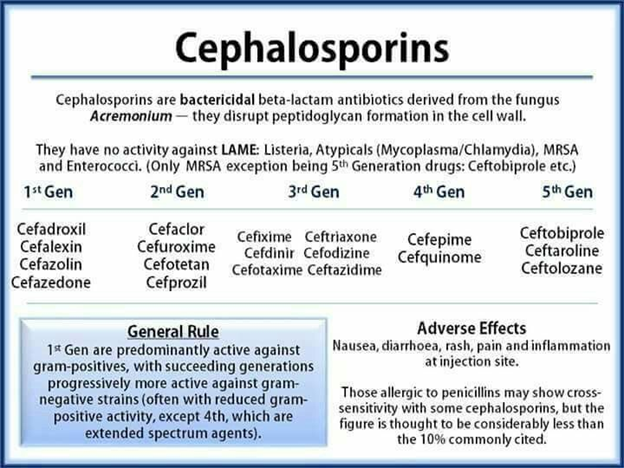A drug that is a fifth-generation cephalosporin which is the first in its class effective against MRSA is:
Ceftaroline (Teflaro)
Cefepime (Maxipime)
Ceftriaxone (Rocephin)
Cephalexin (Keflex)
The Correct Answer is A
A. Ceftaroline (Teflaro) is a fifth-generation cephalosporin antibiotic that is effective against MRSA (Methicillin-Resistant Staphylococcus Aureus). It's the first cephalosporin in its class with this capability, making it a valuable choice in treating MRSA infections.
B. Cefepime (Maxipime) is a fourth-generation cephalosporin that does not have specific activity against MRSA.
C. Ceftriaxone (Rocephin) is a third-generation cephalosporin, effective against a wide range of bacteria, but not specifically targeted at MRSA.
D. Cephalexin (Keflex) is a first-generation cephalosporin, primarily effective against Gram-positive bacteria, but not effective against MRSA.

Nursing Test Bank
Naxlex Comprehensive Predictor Exams
Related Questions
Correct Answer is D
Explanation
A. Reddened tongue and gums: This side effect is not typically associated with ampicillin. However, certain medications or medical conditions can cause changes in oral tissues, leading to redness in the tongue and gums.
B. Digit numbness and tingling: Ampicillin does not commonly cause numbness and tingling in the fingers and toes. These symptoms can be associated with neurological issues or circulatory problems.
C. Bruising and petechiae: These symptoms can indicate bleeding disorders or low platelet count and are not usually caused by ampicillin. It's essential to investigate further if a patient experiences unexplained bruising or petechiae.
D. Skin rash and loose stools: Skin rash is a known side effect of penicillin-type antibiotics, including ampicillin. Loose stools or diarrhea can also occur due to disruption of the gut flora caused by the antibiotic. Patients should be aware of these possibilities and report any severe or persistent symptoms to their healthcare provider.
Correct Answer is B
Explanation
A. "Bactericidal and bacteriostatic are used interchangeably."
Explanation: This statement is incorrect. Bactericidal and bacteriostatic are two distinct categories of antibiotics with different mechanisms of action.
B. "Bactericidal drugs are directly lethal to bacteria, and bacteriostatic drugs work to slow bacterial growth but do not cause cell death."
Explanation: This statement is correct. Bactericidal drugs kill bacteria directly, leading to their death, while bacteriostatic drugs inhibit bacterial growth without causing immediate cell death.
C. "Bacteriostatic drugs are directly lethal to bacteria, and bactericidal drugs work to slow bacterial growth but do not cause cell death."
Explanation: This statement is incorrect. It is the opposite of the correct explanation. Bacteriostatic drugs do not directly kill bacteria, and bactericidal drugs do cause bacterial death.
D. "A bactericidal drug can cause death to the host, whereas a bacteriostatic drug only affects bacteria."
Explanation: This statement is not entirely accurate. While some bactericidal drugs can be more toxic to the host, it depends on the specific drug and its dosage. Bacteriostatic drugs, on the other hand, generally do not directly harm the host. The primary distinction between the two categories is their impact on bacterial growth and survival.
Whether you are a student looking to ace your exams or a practicing nurse seeking to enhance your expertise , our nursing education contents will empower you with the confidence and competence to make a difference in the lives of patients and become a respected leader in the healthcare field.
Visit Naxlex, invest in your future and unlock endless possibilities with our unparalleled nursing education contents today
Report Wrong Answer on the Current Question
Do you disagree with the answer? If yes, what is your expected answer? Explain.
Kindly be descriptive with the issue you are facing.
